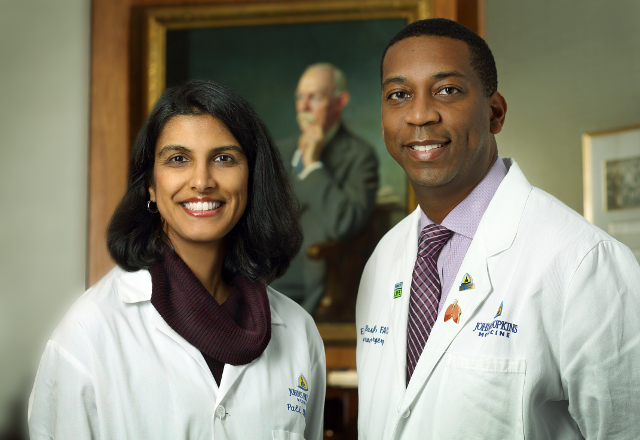Lung Transplant at Johns Hopkins
 Pulmonologist Pali Shah, M.D. and lung transplant surgeon Errol Bush, M.D.
Pulmonologist Pali Shah, M.D. and lung transplant surgeon Errol Bush, M.D.The Johns Hopkins multidisciplinary transplant team includes surgeons, physicians, nurses, social workers, nutritionists, pharmacists, therapists, psychologists and many other specialists. Each member of our team plays a vital role in your patient journey and is committed to providing you personalized, compassionate care.
Lung Transplant: Why Choose Johns Hopkins?
- Since its establishment in 1994, our lung transplant program has remained committed to providing outstanding care, with most patients receiving their transplant within three months of being placed on the waitlist.
- Our first-year survival rate, a benchmark for long-term success, is over 93 percent, which exceeds the national average of 88.58 percent.
- Over 90 percent of our patients report that they have few or no physical activity limitations and that their quality of life improved after transplant.
- Our transplant team is committed to actively working with our patients and their families through every step of the transplant process.
- We continue to build on our history of innovation. In 1983, the first heart-lung transplant in the mid-Atlantic region was performed at Johns Hopkins. Today, we conduct research to develop innovative treatments for lung transplant patients.
FAQs | Lung Transplant
Errol L. Bush, M.D., F.A.C.S, surgical director of the lung transplant program at Johns Hopkins, answers the most frequently asked questions about lung transplantation including patient candidacy, wait times and recovery outcomes.
Referrals to the Johns Hopkins Comprehensive Transplant Center
There are two ways to be referred to the Johns Hopkins Comprehensive Transplant Center:
- Physician Referral
Your physician specialist may refer you directly to the transplant program. We ask that your specialist forward your medical records including demographics and insurance information. Once this information is reviewed, a member of the transplant team will contact you to schedule an appointment. Download the physician referral form.
- Self-referral
To self-refer, call the transplant center and ask for the referral information packet, which contains a candidate form and informed consent document. It is important to return the candidate form, along with photocopies of your insurance cards, to the transplant center within two weeks. The informed consent document is provided for your information and will be discussed during your evaluation appointment.

